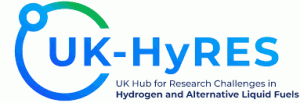A national research hub led by the University of Bath has been awarded £11m to help the UK reach net zero by harnessing the power of hydrogen and alternative liquid fuels.
The funding, from the government’s UK Research and Innovation (UKRI) organisation, aims to make UK-HyRES, the UK Hub for Research Challenges in Hydrogen and Alternative Liquid Fuels, a global centre of excellence in hydrogen research.

This will include delivering practical hydrogen and alternative liquid fuel technologies that are safe and environmentally, economically and socially sustainable.
Finding ways to use hydrogen and hydrogen-based low-carbon liquid fuels such as ammonia is essential for the UK to reach net zero emissions by its target of 2050.
Hydrogen is a highly versatile clean energy carrier suitable for use in many hard-to-decarbonise sectors where other energy options, such as electricity, are not suitable.
The University of Bath is already a major player in research into the use of hydrogen as an alternative fuel.
Last month it announced a three-year project linking its academics with a hydrogen-electric aircraft powertrain manufacturer to work on developing zero-emission aircraft engines.
The university and its Institute for Advanced Automotive Propulsion Systems (IAAPS) have also been selected as strategic partners in a £12.7m initiative to make clean hydrogen-fuelled buses a reality – helping support hundreds of jobs and saving millions of tonnes of CO2.

Meanwhile, IAAPS is also in a strategic partnership with aircraft parts manufacturer GKN Aerospace to develop and validate novel hydrogen technology to help decarbonisation the aviation industry.
The UK-HyRES hub will be led by Prof Tim Mays from the university’s Department of Chemical Engineering. Core universities in the hub also include Portsmouth, Sheffield, St Andrews, Surrey, University College London and Warwick.
Prof Mays, pictured, said: “Research into how we make, store, distribute and use hydrogen and other alternative liquid fuels to power the energy, heating and mobility systems in our society is absolutely essential if we are to achieve our national targets of reaching net zero by 2050.
“At Bath we have the expertise and ambition to deliver this important work, and this major funding from UKRI is crucial for us to develop the UK-HyRES hub into a research centre of national strategic importance and global impact.”
Total funding for UK-HyRES now exceeds £26m following supporting investments from the core university partners and industrial and civic collaborators. These include the West of England Combined Authority, Ceres Power, GKN Aerospace, the Health and Safety Executive, INEOS Technologies, the Western Gateway Partnership and Siemens Energy.



















